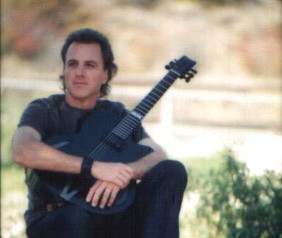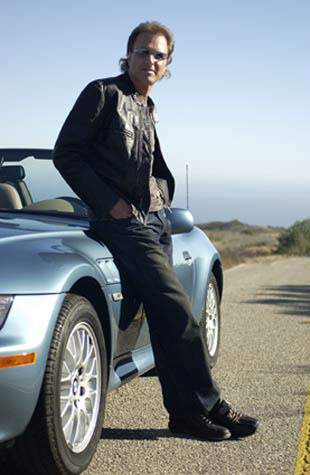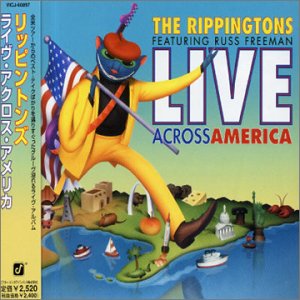 Q1.
How did your solo project start?
Q1.
How did your solo project start?
Russ Freeman:
It started because I had a tune out the "To Grover With Love" Album, and it was called "East River Drive" and it did pretty well at the radio. So people in the record company said "Hey, maybe you should do a solo album." And that was the opportunity that was created so I said, "OK, I'd love to do one," because I hadn't done for many years since my "Holidays."
Q2.
What's the concept of your "Drive"?
RF:
The concept behind the Drive CD was really to feature guitar. I knew people will be going to say, "What's the difference between Russ Freeman and the Rippingtons?" And the answer is I really wanted to focus on my playing as a guitarist, rather than the ensemble that I am usually known for writing for. So I tried to stay away from a lot of the typical sound that Rippingtons used and I tried to write it a different way and not make the record sound same. I tried to make it different. And I made myself really step out and be the lead instrument.
Q3.
Who took part in the recording?
RF:
Jeff Lorber is on the CD and he plays a really nice piano. Chris Botti plays trumpet. He did a great job. Barry Eastmond, a great writer, whom I collaborated with some tunes. I did that that because I wanted to try to have a different angle on some of those song writing. Again I tried not to make it too "Rippington-ish." Eric Marienthal is featured as well.
Q4.
How did the recording take place?
RF:
I did a lot of the work on the pro-tools in my studio here in Florida, but then I also flew to LA and recorded some things there: some of the horns were recorded in Los Angeles and Jeff Lorber recorded some things too. He flew out here, and he did a really nice job and then he also worked some more in L.A.
Q5.
Is there any musician who took part in the recording played golf down there?
RF:
Maybe, let me think.......No (laugh).
(You are the only person who plays golf?)
RF:
No, Eric Marienthal started to play a little golfcand I heard of other musicians that are playing a lot of golf, I know the guys in Fourplay play a lot of golf. And it's funny because I love to play golf, but during the time of the recording, I was working so hard on the record that I didn't play as much as I normally like to.cBut I tried to change that.
Q6.
Will you give us a brief comment on some of your favorite tunes?
RF:
It's funny because I approached this album so differently that I had a whole different relationship to it than I normally do. But I think that some of my favorite tunesc. I really like classical guitar tunes, which would be Bellagio, which is one of them. There's a tune called Villa by the sea, that's really pretty, and that's a nice tune. But I really enjoy playing a lot of my different vintage guitars on the album too, like I play Telecaster on the "Boys of Summer" track. That was fun. Each song is kind of different, I mean, they're all kind of unique.
Q7.
How did you come up with the title "Drive"?
RF:
Funny enough, I had written the tune and I still didn't know what to call the record, but in the end, I thought that just kind of seems to fit the whole vive of the album. I am really glad I did because I really like the Drive track, and I am glad that it's the title track now. You know we are playing it in the concert, and it's getting just such a great response. It's great and it's just a fun tune too. It seems to fit the whole Driving mood on the CD.
Q8.
What's the difference between your past solo albums and "Drive" in terms of the way to compose and record songs?
RF:
The composing that I did for my first solo album was a really precursor to how I have worked with the band. And that was a more ensemble type of composing and I was really writing a lot of melodies for saxophone, and orchestrating a lot of keyboards, and a lot of different parts. And on this album I tried to keep a lot of the accompaniments very simple, and feature more on soloing and just the expo of, artistry of guitar playing, which sometimes I, you know, I've certainly featured in Ripps albums, but not normally anywhere to the extent that I did on this album. As a result, I really want to keep all the accompaniments very simple and not be too harmonically complex or in terms of over-produced. I tried to make it simple.
Q9.
What do you think about your music? The Rippingtons is said to be definitely the NO.1 smooth jazz band right now, but at the same time, many of you fans say that they can hear something more than smooth jazz in your music.
RF:
We are doing more than just playing smooth jazz songs. I think that's been one of the secrets of our success, bring very diverse in the music we are playing, and not just play one little simple direction. And I have always tried to make sure that the band grows musically and experiments and goes in new directions. I think that's important. I am thrilled to be a part of the smooth jazz world, but at the same time, I really want to offer our fans the most we can musically.
Q10.
Is there any possibility for you to play straight-ahead jazz in the future?
RF:
It's possible.
Q11.
In your latest album "Live Across America", we can hear the medley of "Purple Haze," "Fire," "Star Spangled Banner," which reminds us of the performance of Jimi Hendrix at Woodstock in 1969. It says that Jimi played these songs considering the movement of Anti-Vietnamese War. Now in 2002 (especially after 9/11,) you picked up these songs for the album that features the image of the Stars and Stripes with your usual jazz cat on its jacket. Obviously, the choice of the songs and the image on the album jacket deliver American patriotism. Will you explain more about this point? What is your particular message in this album?
RF:
I think that the album was very timely in reference to the 9/11, but we recorded the album almost two years before that. And I think the similarities come from the fact that, you know, I was already feeling the country is such a special place, such a great place. I am in love with the country. I just wanted to express my thanks to our fans and our love of our opportunity to go out and play for them the way we had, we were really able to travel the country and take flavors not just from one concert but from may. I think that's what is special about that concert, and certainly with Hendrix, thirty years later after his death, he is still an icon. I don't know how we started doing that just it seems like kind of fun thing to do. And now our fans are totally loving that.
(Then, is your message "American patriotism"?)
RF:
I think it is. I think that was the natural offshoot of having traveled the country, and the dedication to our fans and our thanks to our fans for giving us the opportunity of playing for them all these years. And we really tried to capture the excitement of the live concerts. And that's what the fans seem to want it. They like the excitement, the energy.
(Do you like Jimi Hendrix?)
RF:
Yes, I do.
Q12.
When did you start playing the guitar? How did you accomplish your technique?
RF:
I started to play the guitar in 1968, when I was only 8 years old. I remember I just listened a lot to the Beatles. The Beatles were my idols. I tried to play guitar play along with what they were playing, and I tried to learn that way. Then we were lucky enough to move to Nashville, Tennessee, which is supposed to be known as music city, there's a lot of great musicians there. So my dad hooked me up with a really great guitar teacher there. He taught me a lot of fundamentals, how to read music, just really put me on the right track for playing guitar, and working my way at it ever since.
Q13.
You had not recorded with anyone before your solo album was released, had you?
RF:
Fairly true. My solo album was kind of what launched it.
Q14.
. How do you compose songs?
RF:
I got asked a lot. And the answer is that I always change the way I write. I don't always write the same kind of music. Sometimes I work rhythmically, other times the harmony comes first, other times I just work off of the melody. Sometimes I work on piano and other times I write on guitar. I write on the piano. I can't really play that well. But I compose most of my music on piano. Then I switch to the guitar. I write with harmony first, then I sometimes fill in with melodies. And I write that way a lot.
(So you can play the piano as well?)
RF:
I tried to, but I was no good at it. Though luckily I know enough about music theory, harmony that I can write that way, but I can't sit down and play songs on the piano. It's too bad because I think it's such a great instrument.
Q15.
Tell us about your future plan for recording and touring.

RF:
The Rippingtons are supposed to go back in the studio in about September of this year. And our album will come out in spring. Next year we will do a pretty big tour.
(Including Japan?)
RF:
Possibly. They are talking about it. It's been a while since we've been over there, huh? We are pretty busy here (in the U.S.) We are talking go over there (Japan) next year.
Q16.
If you express the Ripps' music in one word, what will it be?
*This is the same question that a Japanese radio station (The program called "Kirin Live Paradise" in FM Tokyo) asked Russ when he came to Japan with Brandon Fields, Steve Bailey, Steve Reid, Tony Morales and Mark Portman for the first time in 1989. Russ's answer in 1989 is "FUN."
RF:
That I can't answer!......You know, I can say it "JOYOUS," how's that?
Thank you very much for participating in our interview.
|
 Q1.
How did your solo project start?
Q1.
How did your solo project start?


